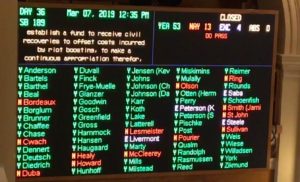
On Wednesday of this week, a federal court blocked enforcement of the unconstitutional provisions of several South Dakota laws, including the notorious, poorly-written “Riot Booster” Act. The bill was introduced in the waning hours of the 2019 legislative session by the Noem Administration specifically to quash the First Amendment rights of individuals and organizations who oppose the Keystone XL pipeline, though the free speech chilling effect of the bill is far broader.
Despite strong objections by individuals and organizations during the its single hearing in the Joint Appropriations Committee, the bill was pushed through committee and both houses of the legislature in less than 48 hours.
The American Civil Liberties Union sued on behalf of plaintiffs Dakota Rural Action, NDN Collective, Indigenous Environmental Network (IEN), and the Sierra Club, as well as Nick Tilsen (NDN Collective) and Dallas Goldtooth (IEN). In July, plaintiffs and other concerned citizens took part in the “Protect the Protectors” rally and march to the U.S. Federal District Courthouse in Rapid City, where Judge Lawrence L. Piersol heard preliminary motions, including a motions by plaintiffs to block enforcement of the act as the case moves forward in court.
This week, Judge Piersol affirmed the concerns of opponents expressed throughout the process—that this sloppily-written and late-introduced bill does not pass Constitutional muster. In his order, Judge Piersol wrote that, “no one has the right to start or participate in a riot” but added that ““The freedom of speech and association are constitutional rights that are central to all citizens of our country. Those rights will be thwarted if the unconstitutional portions of the riot booting legislation remain in effect.”
DRA Board President John Harter had this to say about the Court’s decision: ““Our opposition to the pipeline construction may agitate Gov. Noem, but the First Amendment guarantees us the right to make our voices heard. We’re thrilled that the state is blocked from enforcing the anti-protest laws as the case goes forward. The government has dismissed Native Americans, South Dakota farmers and ranchers and others who oppose the Keystone XL pipeline, but the pipeline, if constructed, would have a substantial impact on all of our lives.”
